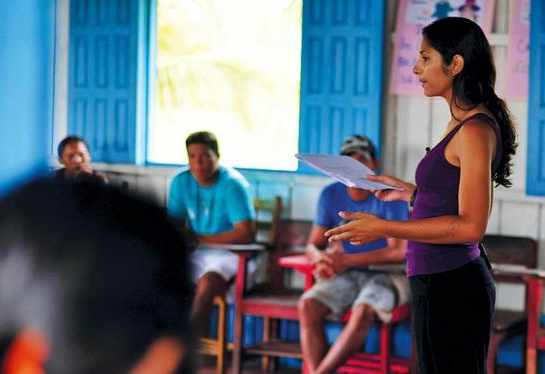
Center for International Forestry Research

Returning results to communities boosts research relationships
Researchers often work closely with forest communities when undertaking studies on livelihoods, natural resource management and conservation. Unfortunately, many researchers don’t take their findings back to the source.
However, CIFOR researchers working on the Global Comparative Study (GCS) on reducing emissions from deforestation and forest degradation (REDD+) is helping to change this trend. GCS-REDD is one of the world’s first comparative studies of pilot projects around the world in the UN-backed REDD+ scheme. The study aims to identify what works in REDD+ initiatives at national and subnational levels across 11 countries.
Local feedback on the results helped our teams improve our interpretations of the data. Also . . . our team will be much more welcome, which should improve the quality of future responses.
Amy Duchelle
CIFOR Scientist
In Latin America, results from surveys on subnational REDD+ pilot initiatives have been returned to five sites in Brazil and Peru so far. The villagers found quantified information about household cash and subsistence income particularly interesting.
Returning survey results has benefits for both the community and researchers, said Amy Duchelle, CIFOR Scientist:
“It highlighted for people . . . where and which activities they’re gaining the majority of their income [from],” Duchelle said, “Village leaders were carefully compiling the information and [stating] they wanted to have [the survey] for their own planning and knowledge.”
Returning the results to REDD+ project proponents was also highly valuable:
“It enabled project implementers to see local people’s hopes and worries in regards to REDD+. This is very useful so they can adapt their projects to address local concerns for more successful outcomes.”
The villagers were also grateful to see the researchers return, thereby building trust and encouraging cooperation for future monitoring and research. Said Duchelle, “I can’t tell you how many times we heard, ‘researchers never come back’, ‘you’re the first group that’s come back, so thank you so much’.”
Watch our video “Protecting forests, fighting climate change” at cifor.org/amazon
